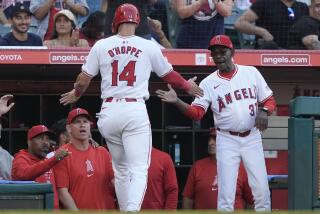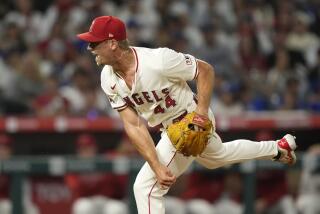Collins Urges Newcomer to Bring NL ‘Stuff’
- Share via
TEMPE, Ariz. — William VanLandingham’s pitches are full of life--they don’t travel at an extremely high rate of speed, but they dip and dart in many directions--and now it is the Angels’ task to harness all the energy this right-hander brings to the mound.
The first step came Tuesday, when the former San Francisco Giant pitcher arrived in camp and received his first piece of advice from Manager Terry Collins.
“I told him that he’s been helped by a lot of people in this game, but he needs to go back to what got him to the big leagues--his stuff,” Collins said. “I saw him a lot in the National League, and he can pitch. I don’t know what happened last year, but he’s a young guy [27], he has great stuff and he was available. The ceiling is pretty high for those kinds of guys.”
VanLandingham had two excellent seasons in San Francisco, going 8-2 with a 3.54 earned-run average in 1994 and 6-3 with a 3.67 ERA in ‘95, but control problems contributed to a shaky ’96 (9-14, 5.40 ERA) and ’97 (4-7, 4.96).
He walked 78 and struck out 97 in 1996, and he had more walks (59) than strikeouts (52) last season, not the kind of ratio a starting pitcher would be proud of.
VanLandingham, not surprisingly, finished 1997 at triple-A Phoenix and became a free agent, choosing to sign with the team that almost traded for him twice in the past two years.
“One reason I came here is they’ve always showed a lot of interest in me,” said VanLandingham, who will compete with Omar Olivares and Rich Robertson for the fifth spot in the rotation and might wind up in the bullpen. Another reason was the pitching coach [Marcel Lachemann]. I talked to a lot of people and they said he was pretty good. It’s always good to have a good pitching coach, since I’m a pitcher.”
VanLandingham, who has a 27-26 career record and 4.54 ERA, is a shy type who likes to keep things simple when it comes to dealing with the media. The Angels hope he carries that approach to the mound.
Instead of trying to locate his sinking fastball and curve on the corners, they think he’ll be most effective if he aims for the middle of the plate.
“We’ve watched a lot of film of him, and when he’s struggling with his control, he’s tried to move the ball around the plate too much,” Collins said. “He doesn’t need to do a whole lot of spotting. His movement will get people out.”
More to Read
Go beyond the scoreboard
Get the latest on L.A.'s teams in the daily Sports Report newsletter.
You may occasionally receive promotional content from the Los Angeles Times.







